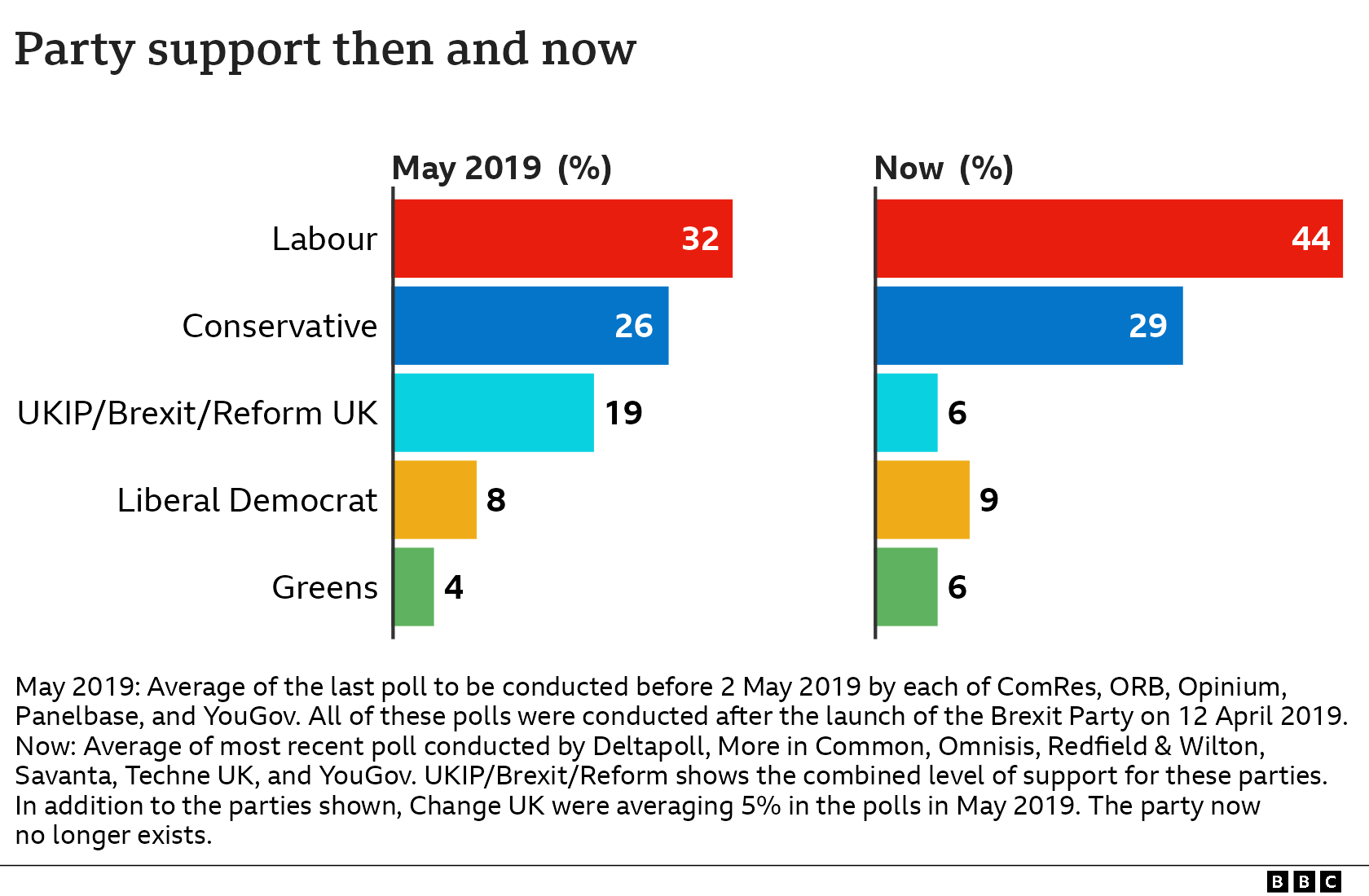Local elections 2023: What do opinion polls suggest?
- Published

This year's local elections, which take place on Thursday 4 May in most of England outside London, have long been billed as a tough first electoral test for Prime Minister Rishi Sunak.
When he took over from Liz Truss as Conservative leader, at the end of October, the party was as much as 30 points behind Labour in the polls - and the spectre of heavy local-council losses this spring has loomed large ever since.
But we need to bear in mind when the 8,050 seats being contested were previously up for grabs. And for 90% of them, that was in May 2019 - which now seems like a forgotten era.

Theresa May was struggling and ultimately failing to push her Brexit deal through the House of Commons. And just three weeks later, she announced her decision to resign as prime minister.
Her party was in the doldrums in the polls and suffered a net loss of more than 1,300 seats in the local elections - meaning this year it has fewer to lose.

What do opinion polls suggest?
With a current average rating of 29% in the polls, the Conservatives are in a slightly better position - by three points - than four years ago.
But four years ago, the Labour Party was also struggling.
Led by Jeremy Corbyn and divided over alleged antisemitism and whether it should back a second referendum on Brexit, Labour also suffered a net loss in the 2019 local elections - albeit of only 86 seats.
But unlike the Conservatives, it is not struggling now.
Labour's lead over the Conservatives has slipped somewhat in recent weeks - but its current poll rating, at 44%, is still as much as 12 points up on four years ago.
At the moment, the Conservatives trail Labour by 15 points. In May 2019, they were six points behind.

This suggests there might be a four- or five-point swing from Conservative to Labour at these elections, compared with four years ago.
That would certainly result in Conservative losses but probably fewer than the 1,000 net losses some party officials have suggested.
But the outcome of local elections does not depend just on the performance of Britain's two largest parties.
Despite having only a modest position in the national polls, the Liberal Democrats made just over 700 gains in 2019.
The Greens - in what was one of their best local-election performances to date - added nearly 200 seats to their tally.
Meanwhile, independents and other smaller parties - seemingly profiting from widespread disenchantment with the two main parties - gained 667 seats.
All these smaller parties are now having to defend a strong performance four years ago - and thus, perhaps, should not set their sights too high this time around.
What can results reveal about national party popularity?
Seats gained and lost compared with four years ago are not the only - or even the best - way of measuring how well parties fare in local elections.
But it is difficult to make other comparisons - because where local elections are held varies from year to year.
Nevertheless, each year, BBC News collects and analyses detailed voting figures to estimate the "projected national share" (PNS) - the share of the vote the parties would have won across the whole of Britain, if voters everywhere behaved in the same way as those who cast a local ballot.

The PNS shows how badly the Conservatives and Labour performed in 2019. Both were credited with less than 30% of the vote.
But the PNS figures never exactly match the performance of the parties in the polls.
The Liberal Democrats always fare better in local elections than their performance in the opinion polls indicates is likely. In 2019, they scored 19% in the PNS even though they were only at 8% in the polls.
A party on course to win a general election should do well on the PNS.
In the years leading up to the 1997 election, when Tony Blair won a landslide victory for Labour, the party was regularly between 15 and 20 points ahead of the Conservatives, according to the PNS.
And David Cameron's Conservatives regularly enjoyed double-digit leads over Labour in the years leading up to their success in 2010.
Labour has not performed that well in any local election since 2010. Next week, we will find out whether this year it has succeeded in doing so.
Sir John Curtice is professor of politics at the University of Strathclyde and senior research fellow at the National Centre for Social Research and The UK in a Changing Europe.

